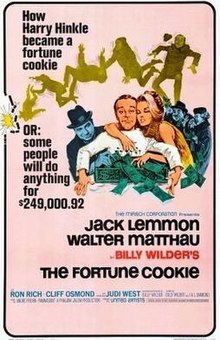
John Uhler Lemmon III was an American actor. Considered proficient in both dramatic and comic roles, Lemmon was known for his anxious, middle-class everyman screen persona in dramedy pictures, leading The Guardian to label him as "the most successful tragi-comedian of his age."

The Apartment is a 1960 American romantic comedy-drama film directed and produced by Billy Wilder from a screenplay he co-wrote with I. A. L. Diamond. It stars Jack Lemmon, Shirley MacLaine, Fred MacMurray, Ray Walston, Jack Kruschen, David Lewis, Willard Waterman, David White, Hope Holiday and Edie Adams.

Billy Wilder was an Austrian-born filmmaker and screenwriter. His career in Hollywood spanned five decades, and he is regarded as one of the most brilliant and versatile filmmakers of Classic Hollywood cinema. He received seven Academy Awards, a BAFTA Award, the Cannes Film Festival's Palme d'Or and two Golden Globe Awards.
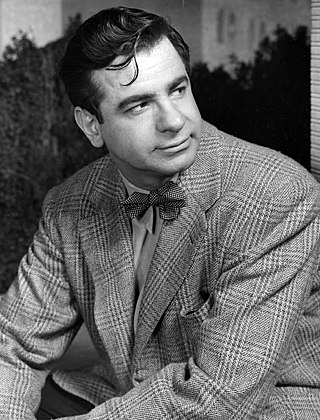
Walter Matthau was an American actor, comedian and film director. He won the Academy Award for Best Supporting Actor for his performance in the Billy Wilder film The Fortune Cookie (1966).
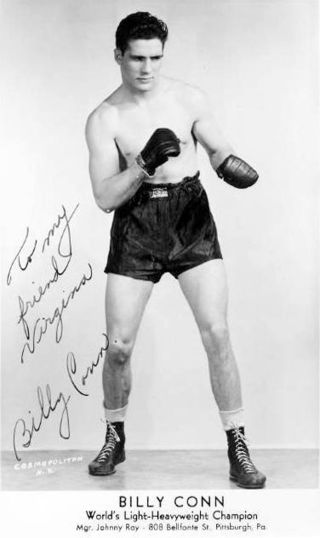
William David Conn was an American professional boxer and Light Heavyweight Champion famed for his fights with Joe Louis. He had a professional boxing record of 63 wins, 11 losses and 1 draw, with 14 wins by knockout. His nickname, throughout most of his career, was "The Pittsburgh Kid." He was inducted into the International Boxing Hall of Fame in the inaugural class of 1990.

I. A. L. Diamond was a Romanian–American screenwriter, best known for his collaborations with Billy Wilder.
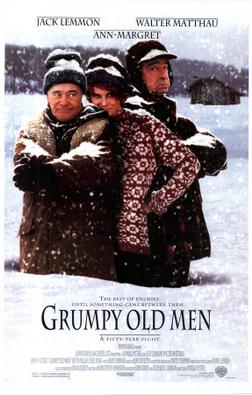
Grumpy Old Men is a 1993 American romantic comedy film directed by Donald Petrie, written by Mark Steven Johnson, and starring Jack Lemmon, Walter Matthau, Ann-Margret, Burgess Meredith, Daryl Hannah, Kevin Pollak, Ossie Davis, and Buck Henry. It was followed by the sequel Grumpier Old Men.

The Odd Couple II is a 1998 American buddy comedy film and the sequel to the 1968 film The Odd Couple. It was the final film written and produced by Neil Simon, and starring Jack Lemmon and Walter Matthau. Released nearly three decades later, it is unique among sequels for having one of the longest gaps between the release of both films in which all leads return. The Odd Couple II premiered on April 10, 1998, and was a critical and commercial failure, grossing less than half than its predecessor at the box office.

Marjorie Redmond was an American actress and singer.

Billy Wilder (1906–2002) was an Austrian filmmaker. Wilder initially pursued a career in journalism after being inspired by an American newsreel. He worked for the Austrian magazine Die Bühne and the newspaper Die Stunde in Vienna, and later for the German newspapers Berliner Nachtausgabe, and Berliner Börsen-Courier in Berlin. His first screenplay was for the German silent thriller The Daredevil Reporter (1929). Wilder fled to Paris in 1933 after the rise of the Nazi Party, where he co-directed and co-wrote the screenplay of French drama Mauvaise Graine (1934). In the same year, Wilder left France on board the RMS Aquitania to work in Hollywood despite having little knowledge of English.
Stuart Rosenberg was an American film and television director whose motion pictures include Cool Hand Luke (1967), Voyage of the Damned (1976), The Amityville Horror (1979), and The Pope of Greenwich Village (1984). He was noted for his work with actor Paul Newman.
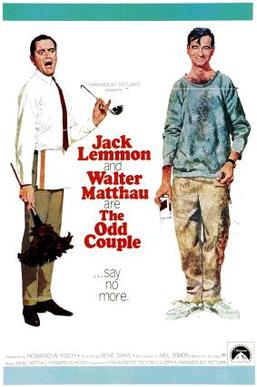
The Odd Couple is a 1968 American comedy film directed by Gene Saks, produced by Howard W. Koch and written by Neil Simon, based on his 1965 play. It stars Jack Lemmon and Walter Matthau as two divorced men – neurotic neat-freak Felix Unger and fun-loving slob Oscar Madison – who decide to live together.
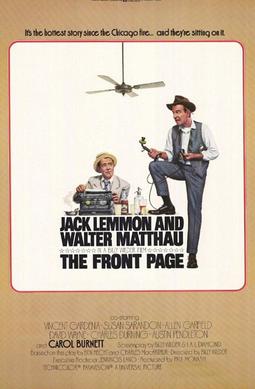
The Front Page is a 1974 American black comedy-drama film directed by Billy Wilder, and starring Jack Lemmon and Walter Matthau. The screenplay by Wilder and I. A. L. Diamond is based on Ben Hecht and Charles MacArthur's 1928 play of the same name.

Felicia Farr is an American former actress and model
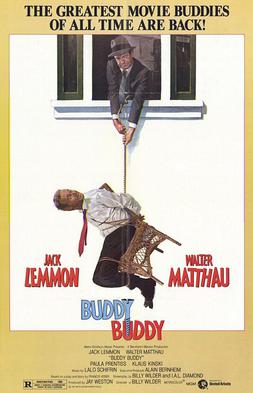
Buddy Buddy is a 1981 American comedy film based on Francis Veber's play Le contrat and Édouard Molinaro's film L'emmerdeur. It was the final film directed and written by Billy Wilder.
Judi West is an American actress, best known for her supporting role opposite Jack Lemmon in the comedy film The Fortune Cookie (1966).

Renato Turi was an Italian actor and voice actor.

Jack Lemmon was an American actor. He collaborated with Billy Wilder and Walter Matthau on many films.
Jack Lemmon (1925–2001) and Walter Matthau (1920–2000) were a pair of American male actors who starred in ten films together, co-starring in eight of them. In addition, Lemmon directed Kotch (1971), which starred Matthau. Off-screen, they were best friends, though their characters constantly clashed on-screen.
